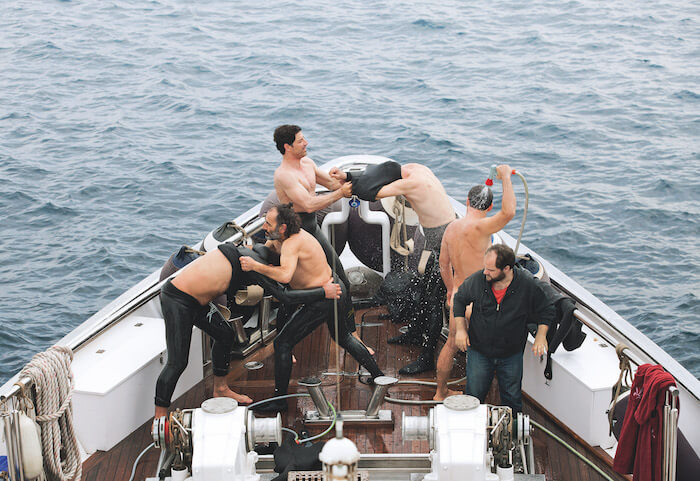“I’ve got a beautiful erection, enduring and engorged!”: Chevalier


Chevalier
Directed by Athina Rachel Tsangari
Opens May 27
For the six men at the center of Chevalier, a superb Greek film about masculine infighting in the information age, no front is too trifling to compete on. As a friendly fishing trip on the Aegean devolves into a nebulous contest to determine “the best in general” among them, they race to build Ikea shelves, they compare the results of their bloodwork, and they rate one another’s sleeping postures. Even individual conversations become rapid-fire oppositional, opportunities to shame the other party into feelings of inadequacy. “How many fillings do you have?” asks the Doctor (Yorgos Kendros), the eminent owner of the yacht, to his handsome young colleague Christos (Sakis Rouvas). “Two, and one root canal,” Christos proudly replies. “How many times a day do you brush?” the doctor fires back. “Three,” answers Christos, who’s soon made uneasy by his superior’s silence. “Maybe it’s not enough. I should do it more often.”
With its bourgeois Olympics and its closed-system setting, the devastatingly funny Chevalier, the third feature by Athina Rachel Tsangari (following her body-conscious 2010 film Attenberg), lays bare the fact that while the man might leave the boys’ school, the boys’ school never quite leaves the man. Tsangari frequently cuts to shots-from-above that show the prow of the yacht poking into the bottom middle of a frame otherwise filled with water, obviously phallic images that also carry a distinct air of scholastic formality, the outline of the vessel resembling nothing so much as the tip of an oversize beginner’s pencil. Indeed, the boat comes to resemble a dorm unsupervised: The men make a series of juvenile chores (window-washing, silver-polishing, etc.) into a single blowout time trial; later, in a bizarro talent-show display, rotund bachelor Dimitris (Makis Papadimitriou) lip-synchs to Minnie Riperton while his svelter brother, Yorgos (also the doctor’s son-in-law, played by Panos Koronis), lets off sparklers in the background.
These colleagues and relations spend even their downtime applying a thoroughly adolescent scrutiny to their middle-aged bodies, as if preparing for a reality-show close-up. So it is that Christos tentatively displays his calf muscles to his wife over Skype (the computer screen containing the film’s only fleeting glimpse of the opposite sex), and the sleepy-eyed Josef (Vangelis Mourikis) tries to waken his companions so he can parade the hard-on he couldn’t achieve earlier, when everyone else submitted a dick pic for evaluation. “I’ve got a beautiful erection, enduring and engorged!” he declares, in the most hilariously pathetic exhibition of sexual viability since Paul Rudd tried to psych himself up for polyamory at the high point of David Wain’s 2012 commune comedy Wanderlust.
During one challenge late in Chevalier, the men evaluate each other’s speakerphone calls to their significant others, their smartphones all placed on the table they’re sitting round, right next to the little notebooks they tabulate points in. As it sails along, Chevalier—with its frequently visible laptops and mobile devices, and its characters’ straight-faced pursuit of the most quibbling of metrics—becomes just as much about the alluring trap of the quantified self as it is about timeless masculine vanity. Go figure that Chevalier shares a co-writer, Efthymis Filippou, with now-playing dystopia The Lobster, which is highly attuned to how dating apps often only wind up reinforcing conventional behaviors and biases, supposedly disruptive user-friendliness notwithstanding.
Refreshingly, Tsangari doesn’t seem concerned with building suspense around who’s currently winning, and who might ultimately win, the best-in-general sweepstakes. She does take care, though, to include occasional speculations about the outcome from the ship’s captain, cook, and sous-chef. Each has a different horse in the race, so to speak—the employees notably don’t take the seemingly perfect opportunity to mock their employers, but instead get caught up in the game themselves. By the time the contestants finally disembark from the boat and leave it in the hands of the crew, Tsangari has shown the barriers to progress among this particular part of the population. These men can’t help but spend their time validating the hierarchies that exist among them—especially now that there are more ways than ever for them to measure their supposed worth.
You might also like 




















